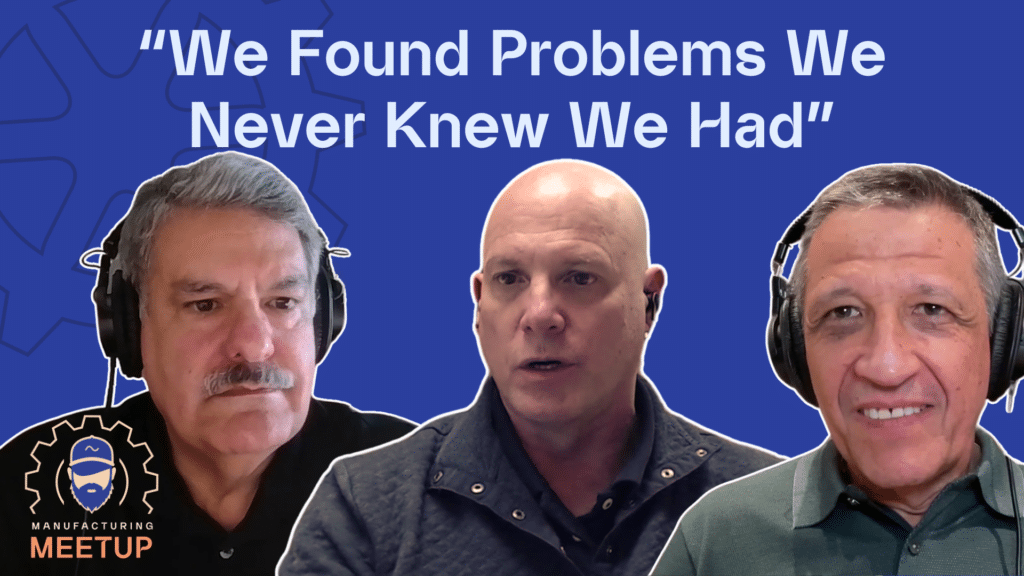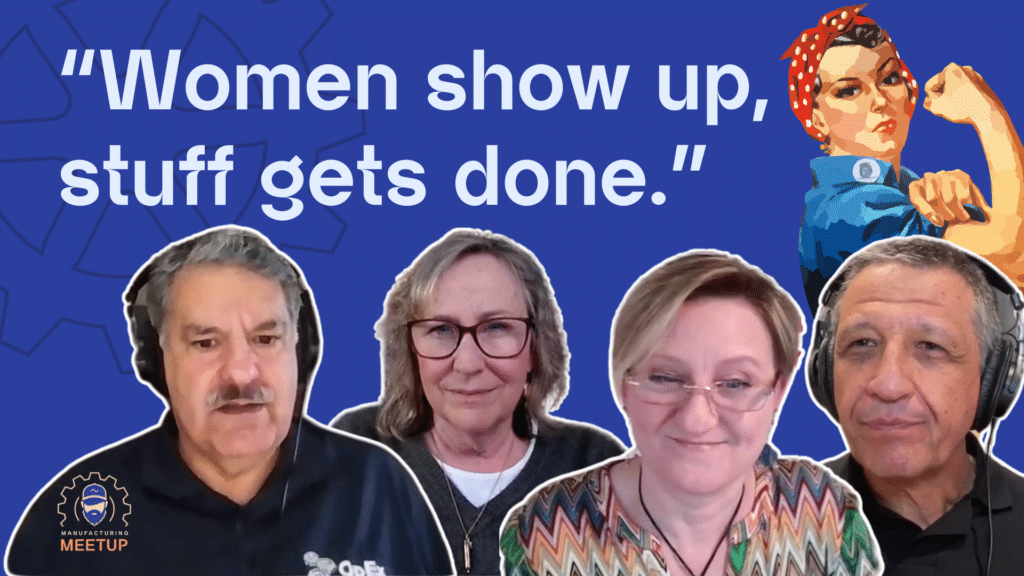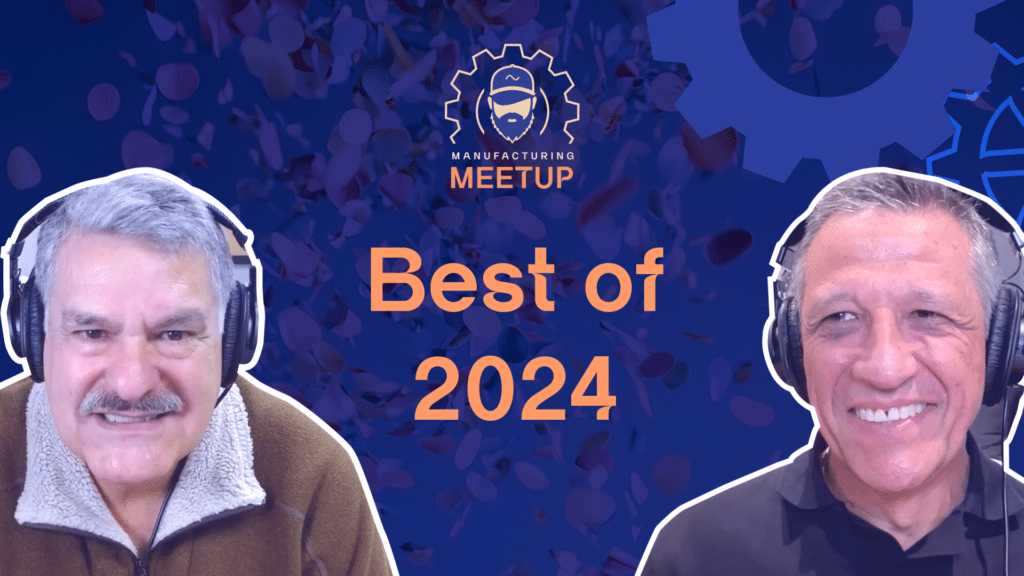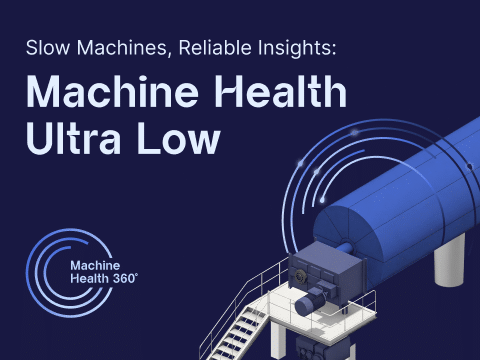Ask Me Anything: AI, Crazy Machine Fixes, and Mentorship
In this episode of the Manufacturing Meet Up, Ed Ballina and Alvaro Cuba discuss the evolving role of AI in manufacturing, emphasizing its potential as a collaborative tool rather than a replacement for human workers. They cover creative (or kind of crazy) machine and process fixes on the shop floor and drive home the importance of mentorship in professional growth.
Takeaways include:
- Collaboration between humans and machines is key.
- Simplicity in solutions can lead to significant improvements.
- Owning your work leads to greater satisfaction and success.
To keep the conversation going:
Email us: mmu@augury.com
Find us on The Endpoint: endpoint.augury.com
Download the full podcast here:
Apple
Spotify
Amazon Music
iHeart Radio
YouTube Music (formerly Google Play)
Full Transcript
Ed Ballina
Hello, Manufacturing Meet Up friends. I’m Ed Ballina.
Alvaro Cuba
Hello, guys. Alvaro Cuba here.
Ed Ballina
Well, we are coming to you again with our Manufacturing Meet Up with our AMA segment that has proven very, very successful in the past, and very popular. We love taking questions. And we just got to tell you that we’re excited to continue doing this time and time again. So, thanks for tuning in today and keep this manufacturing meet up going. And we are ready to take off and really move on with the next questions in this podcast where we kick back, talk about the shop floor, and maybe even exchange one or two funny war stories. I got a feeling you may have some of this coming your way. With that, let’s get started.
Alvaro Cuba
So as Ed mentioned, this is our AMA and thanks to you all guys out there, they keep sending questions or comments through the different channels. So we try to tackle two or three in each episode. So please continue doing that. So let’s start. Ed, ready? Ready to go. Two, three, one, zero, go. Go.
Question number one. Question for you. Do you think AI is a tool that supports manufacturing or do you think a controlling system handling everything while humans will sit back and watch from outside?
Ed Ballina
Good question. You’ve been hearing a lot of talk about AI, some of it, most of it extremely exciting. And with tremendous promise for the future. And then you hear some other folks that are like, be careful with AI, because if it starts thinking for itself, it’s going to realize that human beings, maybe we’re not so good for the planet, and maybe not so good for ourselves. But I choose to take the positive approach. I think we’re smart enough to use AI in a way that’s really going to enhance our lives as human beings and help us, frankly, with some of the issues that we have with sustainability, climate, et cetera. So to get back to your question, kind of this big brother approach to AI, while it’s only something to be cautious of and feared, I think suboptimizes the real potential here, which is to get folks to ante up their game and their understanding by using what AI brings to their party. So it could be a huge, huge enabler.
And look, admittedly, there’s going to be some jobs that are eliminated. We have had a conversation about supermarket checkout, right? It’s got bugs, it’s got issues, but let’s face it, realistically, folks, we’re gonna be scanning our own stuff unless you have a huge order. And those jobs are gonna go away, but there’s the potential to upskill those employees into something like maintaining those pieces of equipment, right? Because they don’t fix themselves.
Ed Ballina
The other one that we discussed about, some of you know I’ve had an interest in drones and was going to start the solar cell inspection business using drones. And while that’s still a tremendously viable business opportunity, it’s not going to be very long. It’s happening already where if you own a solar cell farm, you have a little box to the side that contains your drone. And once a week that drone opens up, it automatically launches itself because it knows what it has to measure.
It goes up when it detects the battery is low, it comes back, it automatically changes the battery, it goes up for another session, and lo and behold, now you can legally do that in FAA terms, because you need to, as a pilot, maintain sight, but at some point in time, these autonomous drones will perform some of the functions that are happening today. But to me, the key with all of this, like almost anything we do in manufacturing or any kind of business enterprise, it’s about the level of engagement, right? If you engage folks, which by the way will also drive your results at much higher levels, you will, you’re not giving up autonomy to this machine. You’re letting it handle mundane tasks that you don’t really need people to do anymore. And the folks that were doing that can be thinking about how to take the process to the next level. So, Alvaro, your thoughts?
Alvaro Cuba
Yeah, I think the big potential is collaboration, is human-machine interface. Things like human judgment, creativity, problem solving, innovation, curiosity, growth, potential. All those things are going to be much better with AI. And as you were saying, there are things that AI is going to be doing better and we need to use that. No, I always remember many, many, many moons ago and we were… doing the exams manually. And then it came the calculators, the scientific calculators that in engineering you were putting three or four things and the problem solved, the answer were coming. And we were saying, we don’t need to do exams anymore. Well, immediately came the other exams where judgment and innovation and creativity and things keep evolving like that. When the internet came, it was the same discussion. So I think there is a great potential if we collaborate both. And you also mentioned another important point. Yes, some roles are going to be eliminated, but I support startups on high tech and artificial intelligence. And I was in a conference two, three weeks ago with a lot of startups, the amount of role of jobs that those startups are creating and small companies with these new ideas and hiring people and bringing people in is amazing. So it’s going to be probably a shift. So, keep the mind open and keep just training in new skills that AI is bringing to the table.
Ed Ballina
Yeah, very important to learn. You guys know that I always go off on little stories. Your thing about the scientific calculator, let me tell you, horrible experience, right? I’m a junior in college. I’m taking a high level thermodynamics course, which I hated. So I bought a TI-59 calculator, programmable, and I spent half the night programming little magnetic cards about this big with all the equations that I needed for the exam for thermodynamics. I’m sitting, and I got this right. I’m sitting in the class, that comes. Oh yeah, that’s card number four, had it labeled right. I run the thing the magnetic reader didn’t work right. And I was like I wasted 15 minutes because it was like a huge saver. Yeah, not so much. So anyway, that was my horrible TI 59 But going back, question for you and this is the fun one folks, this one we’re going to have a little fun with. So Alvaro, what is the best improvised solution, craziest fix or funniest repair that you’ve ever seen to a problem on the shop floor?
Alvaro Cuba
Well, I have two examples and but first a disclaimer, the best ones that I have seen, the best ones have been always brought up by the mechanics and the operators. Absolutely. They are the ones who have the experience, the hands-on knowledge, and once they bring those ideas, they change. I remember once in a manufacturing plant that was canning milk, millions of cans passing and passing and passing. And this guy, an operator in the machine, machine that was welding the lid. Yeah. And he came and said, Hey, I noticed that there is one eighth of an inch too much. And if we can just eliminate that, can you imagine saving all that material for millions and millions of cans and then the cans in the boxes. So you can eliminate. a carton on the boxes. Then you stack that into the trucks so we could eliminate trucks out. So it was the winner of the year. And I think in 10 years, no other idea brought more money to the table. Very simple, straight observation. That was a great one.
And the other one is we had jars and the jars we needed to check that if they were filled properly enough. And we had a very sophisticated machine with weights and counterweights and all that, electronics and all that. And one day it stopped working and we were producing thousands an hour. And one of the mechanics came with one spring and one small bar. So he was putting the spring and the jar was passing. If it had enough weight, the spring was going down and was passing the bar. If it was not enough weight, it was not too much and the bar was taking the jar out of the line.
So, so simple. change. One year later, all the machines were using the springs and the bar. Almost no cost. Very few moving parts, right?
Ed Ballina
Yeah. I love the simplicity of the shop floor solutions. I had a similar situation with shells. So, you know, when you go to the store and you see these blue plastic shells that bottles come in.
We process them through the facility. That’s a returnable package for us. And the machine that drops this is called a shell denester, and they would occasionally drop two shells at a time. Well, that’s a problem because it doesn’t fit in your machine. Now you’re shut down. And I had a gentleman in there looking at some single minute exchange of die opportunities, right? Quick changeovers on the line. I said, hey, man, you’re really good at this. Take a look at my shell problem. Half an hour later, I come back.
He’s got a piece of angle iron that he put across the conveyor that comes out of the shell denester. Same thing. He set it to a height that if it was a single shell, it would pass underneath it. If he had a double shell drop or more, it would catch the top of the angle iron and it would, at a 45 degree angle, it would just throw it off the line. I mean, like what? $1.75 of angle iron and a couple of screws. It was amazing. Now, I will tell you the funny one.
So the funny one is, I was, again, the creativity of our folks never ceases to amaze me. I was hosting a senior, senior supply chain manager tour two weeks after taking over a facility, a small facility in Texas. I mean, the guy hired me into the company, I know he respected me, but he also made it a point to set the standard for me as to what he wanted to see in a plant. And it was not fun for me at all.
One of the worst moments comes as we’re rounding the corner of one of my palletizers and at the discharge of the palletizer, there’s a bunch of photo eyes to tell the machine, I have enough pallets, don’t make anymore because I can’t take any, right? Well, our forklift drivers, as they are wont to do at times, had whacked the bracket for the photo eye and the photo eye had fallen down while one of my very industrious folks had picked up the photo eye, put it in the bracket that was all bent and then sourced a piece of broken wood from a pallet and jammed it in place. not even that Alvaro, because it was a metal bracket. He just shoved it in there so the photo eye couldn’t move right. He put it in the other way. So as I’m rounding the corner with this guy who’s like senior vice president, Mucky Muck, right. And I’m a new minted plant manager. He looks down. He looks at me and he goes, is that your standard? Right. Like this. Right. I was like, Obviously not. And I was looking around like somebody better fix this. thing, like immediately! Yes, so it is the one for creativity. Yes, have to say out of the box and the simpler the better. Except sometimes it’s out of the box and off of my skin, depending on what changes.
Alvaro Cuba
Yes. OK, the third question for you, Tell us the best career advice that you received from a mentor.
Ed Ballina
I have been incredibly fortunate and blessed. I’ve had a lot of mentors in my life and I owe them, you know, where I am today. It takes a village folks. None of us get here by ourselves and Alvaro and I have talked about this. Frankly, it’s one of the reasons why we do these podcasts, right? We learned a lot and we’d like to pass it on to you. Maybe avoid some, you know, learning by pain that many of us go through. So this is our way of giving back as well.
But the best career advice, I think from a number of mentors was don’t be afraid to ask for help. None of us have all the answers and showing the humility to ask somebody for help because you don’t know, I think, first of all, speaks to your kind of intellectual intelligence that you recognize that’s a hole you have in your capability and then the willingness to ask somebody for help and get their input.
That’s a real good one. If you want a real funny one, I am a fan of The Office and I think one of the characters there, and you’ll know exactly who I’m talking about, when asked to… Don’t look at me. guy that owns Schrute’s Farm on the show, right? When he asked a similar question, he says, “I look at somebody that does something stupid and I choose not to do something that’s stupid.” And I’m not, I’m paraphrasing it. He said it’s so much better, right? But it was like, I see what stupid is. I try not to do it. So that’s another real good one. Great. How about you, Alvaro?
Alvaro Cuba
Ed mentioned about mentors. Look for them guys. So it’s not. If the company doesn’t give you, if someone doesn’t volunteer, you go and you look for the mentor. And better is not your boss or someone around, better someone that has the bigger picture and can help you. But mentors are a gift. And we should all be very thankful to have mentors.
When I was just getting out of university and starting to work, one of my mentors told me, own it. Everything you are going to do, you own it. Put the energy, try to do the best and then own it all the way. And I was very lucky because I came into this company and Ed, you will, this will resonate to you in your Pepsi Coke times.
No, it is. It was a company that not only the individuals, but the company as a culture own it. No. And they were saying my process, my equipment, my products and how proud. No, this is is going to sound fun. But in that company, we were producing chocolate and cookies and crackers and, and they were giving us a basket every month to take home. So at home, our kids, they can only eat what we produced. I couldn’t find anything that was from the competition. So I was bringing that. It was forbidden to buy anything that was from the competition.
Ed Ballina
I’ve always been, you know, just completely loyally focused to the company that I’m working for. I mean, Procter & Gamble, I used to get upset when I went to my brother-in-law’s house in New Jersey, because that area of New Jersey, Scott Tissue is king, right? Because it’s 1,000 sheets per roll, especially in the city, people don’t have space to store a lot of products, so Scott Tissue, right? So go to her house, I was working for P &G, I wanna see Charmin, I wanna see White Cloud, I wanna see Bounty, right? So when my wife and I first got married, she’d go do the food shop and she’d bring home what I would call foreign products. I was like, do not ever bring that into this house again, right? Or, you know, with with Pepsi and Coke it’s even worse because you have two, you know, very few industries where you have two major behemoth players that have been at each other for decades, right? Oh my goodness. No, I used to, I have to admit, I used to be a diet Coke drinker. And when I started working for Pepsi, there was not a a Coke product could be found anywhere in my house. Yeah, yeah. You know, so it’s It’s a territory, yeah. Yeah.
Alvaro Cuba
And one last thing is with life changes and with career evolution, you need to be looking for different mentors and different opportunities because the moment changes, no? That was when I started when I moved more into the managerial roles, no, one came and told me, you take the strategy division, bring the resources and then get out of the way.
Ed Ballina
I love it. Get out of the way. Yes. That’s awesome. Okay. I think that’s kind of bringing us up to our end to another segment of AMA. And it’s not that wrestling thing, you know, the fighting thing that people do. We’re a lot kinder, gentler than that. But hey, thank you so much for tuning in today. Really want to keep the meetup going, and especially these great questions that come up. Feel free to submit them to us. You can email us at mmu @ augury.com. You can also find us on The Endpoint, which is a free online community for manufacturing pros like you and me and Alvaro and you can find that at endpoint.augury.com. So we’ll throw us addresses in the show notes as well. So amigo, bring it home.
Alvaro Cuba
Yeah. And first, thank you guys. Keep sending your questions and thoughts. If you really enjoy it, follow us, subscribe. More important, tell your friends, bring your friends to the bar or to the coffee shop. Let’s sit down. Let’s kick back and have a great time. Like us or give us a review and have a great night. Take care, team.
Meet Our Hosts

Alvaro Cuba
Alvaro Cuba has more than 35 years of experience in a variety of leadership roles in operations and supply chain as well as tenure in commercial and general management for the consumer products goods, textile, automotive, electronics and internet industries. His professional career has taken him to more than 70 countries, enabling him to bring a global business view to any conversation. Today, Alvaro is a strategic business consultant and advisor in operations and supply chain, helping advance start-ups in the AI and advanced manufacturing space.

Ed Ballina
Ed Ballina was formerly the VP of Manufacturing and Warehousing at PepsiCo, with 36 years of experience in manufacturing and reliability across three CPG Fortune 50 companies in the beverage and paper industries. He previously led a team focused on improving equipment RE/TE performance and reducing maintenance costs while improving field capability. Recently, Ed started his own supply chain consulting practice focusing on Supply Chain operational consulting and equipment rebuild services for the beverage industry.




